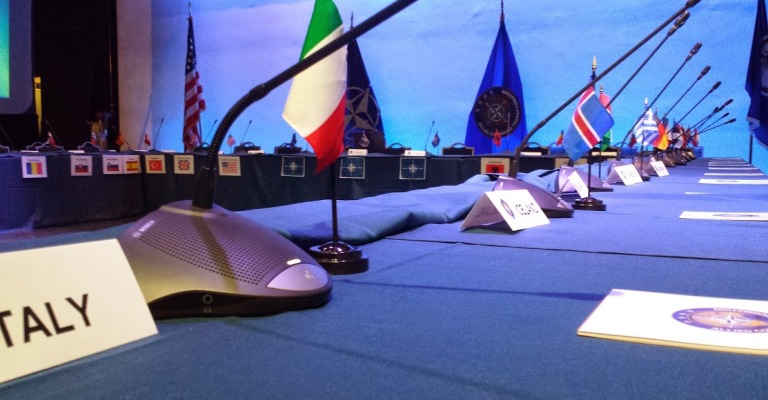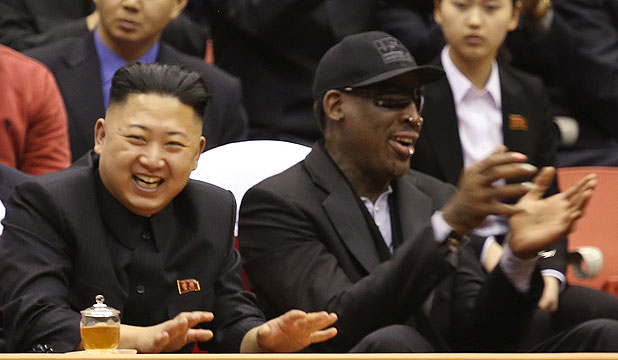
Would you like to have a Colonel from the Heer, the German Army, as a mentor?
How about a Commander from the Royal Navy?
A handful of lucky students from high schools around Virginia had this opportunity in March 2015, as part of the Model NATO Challenge organized by NATO’s Allied Command Transformation(ACT) in Norfolk, Virginia. Twenty-eight students, each representing a member state of the alliance, received assistance with research and preparation from an officer in their respective country’s military.
The Model NATO Challenge is undoubtedly the most sophisticated of its kind, having direct access to military personnel and taking place inside the ACT’s headquarters. However, other Model NATO gatherings are steadily growing in prominence. The Challenge in Virginia began in 2007, but now has a competitive application process requiring both a student-submitted essay and a teacher recommendation. Nearly 150 students annually attend a conference at Carleton University in Ottawa, and two of the largest international Model NATO conferences, held in Washington DC and Bucharest, Romania, see nearly 200 each.
There is still room to expand, naturally. Few of the existing conferences devote time to simulating the economic cooperation between countries, or the political criteria necessary for prospective members to join the alliance. Some of these activities are inherently bilateral in nature, such as the Canadian-Turkish Business Council, but could still stand alongside committees emulating the traditional military focus.
Alas, though schools across Canada travel abroad to Model NATO conferences in the United States, Carleton’s conference is currently the only one of its kind north of the border. Delegates do not receive mentoring in advance, but are expected as university students to be better prepared beforehand. Instead, they receive a briefing at the embassy of their assigned member state.
For interested college and university students, institutions in Canada that send teams to Model NATO conferences include York University, L’Université Laval, L’Université du Québec à Montreal, Carleton University, the University of Western Ontario, Glendon College, Simon Fraser University, Nipissing University, Dalhousie University, and the University of Windsor.
The benefits are considerable for those able to attend. A firm grasp on the topics discussed is both a contributor to and a result of gatherings like Model NATO. The opportunities to meet and network with like-minded people are extensive. The chance to meet and learn from professional diplomats is invaluable for students who imagine their future selves in a similiar role. All of these combine to ensure the experience is a memorable highlight of any student’s education.
In one regard, even Model United Nations falls short in comparison. While the UN General Assembly inevitably requires some discussion and compromise for a majority vote to succeed, NATO requires consensus from every member state to act. If negotiations break down, a single ‘no’ vote can prevent action, much like the veto on the UN Security Council. Simulations reflect this accurately, making compromise necessary and providing the participants with experience in negotiating. This will always be useful, no matter what career they choose.
Greater in importance than the skills learned, and greater than the modest scholarships offered as prizes, activities such as this fundamentally reshape students’ worldview and way of thinking, providing a foundation for the aforementioned skills. As I’ve previously mentioned, establishing a deep understanding of the issues at hand is a necessary component to do anything related to international relations, and the students at Model NATO conferences are learning directly from individuals with first-hand experience.
These lessons will apply even if those students seek completely different futures. The Model NATO community is too small to merit formal surveys, but data from Model United Nations can stand in as a reasonable approximation. The necessarily skills overlap to a large degree, the experiences share many similiarities, and I suspect that the benefits will as well.
One of the few global surveys of current and former participants, the detailed results of which are here, indicates that a majority committed three or more years to the activity. Substantial majorities asserted that participation had improved multiple career-related skills, such as public speaking, collaboration, and leadership. Equal numbers reported personal benefits like helping with higher self-confidence, having beliefs challenged, and social life.
This survey adds empirical support to the anecdotes of my personal experience. Friends of mine who took part in Model UN have, only a few years after high school, traveled such different paths as joining the Primary Reserve of the Canadian Forces, conducting experiments on genetically modified yeast, and helping private equity investors. All of them, however, fondly recall the memories made then and the skills they learned from one another.
I should note that their participation was largely self-directed, with advice from a faculty member during the opening stages of research, when we learned rules and procedures. At the ACT’s Model NATO Challenge, delegates receive guidance every step of the way, an unparalleled degree of support. How much grander would our own experience have been with trained professionals on hand, like Canada’s Permanent Mission to the United Nations?
I will never know, but the students in Virginia certainly do.
In the meantime, as the wizard Gandalf put it, “All we have to do is decide what to do with the time that is given to us.”




